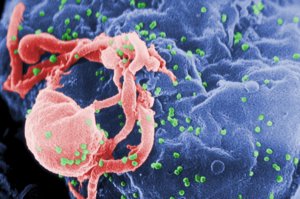What is HIV?
HIV (Human Immunodeficiency Virus) is a virus that attacks and breaks down the human body’s immune system, specifically the CD4 cells (T-Cells), over time. The immune system and T-Cells are your body’s internal defense army, working constantly to fight off germs, diseases and infections. A healthy person’s immune system does such a good job that most of the time, the problem is taken care of without any noticeable fatigue or sickness.
HIV slowly reduces the number of T-Cells in your body, making you weaker and more likely to get badly sick, get infected or develop infection-related cancers.
Eventually, so many T-Cells are destroyed that your body can no longer fight off even small illnesses such as the common cold. These germs don’t make healthy people very sick, but can lead to serious, often life threatening infections and cancers in someone whose immune system has been compromised by HIV.
The last stage of HIV is AIDS (Acquired Immune Deficiency Syndrome), which is signaled by your body being unable to fight off even small sicknesses. Not everyone with HIV progresses to this stage. Without treatment, people who are diagnosed with AIDS typically survive about 3 years. Once someone has a dangerous illness, life expectancy without treatment falls to about 1 year. People with AIDS need medical treatment to prevent death.
Every 9 1/2 Minutes, someone in the U.S. is Infected with HIV.
People infected with HIV may have no symptoms for ten or more years. They may not know they are infected.
An HIV test is the only way to find out if you have HIV.
What are the Symptoms of HIV?
One of the worst aspects of HIV is that most people who are infected do not notice symptoms for many years.
The CDC estimates that in the United States, 170,000 Americans are infected with HIV but do not know it.
Furthermore, the longer an individual goes without treatment for HIV, the more unseen damage the virus does to your body, shortening life expectancy and making your immune system weaker and weaker.
An infected individual may experience flu-like symptoms shortly after transmission of the virus. Other symptoms may include the following:
- Rapid unexplained weight loss
- Dry cough
- Chronic headache
- Diarrhea that lasts more than a week
- Chronic yeast infections or oral thrush (yeast infection of the mouth)
- Recurring fever and/or night sweats
- Muscle and joint pain
- Sore throat
- Extreme and unexplained fatigue
- Swollen lymph glands in the armpits, groin or neck
- Unexplained body rashes
- White spots or unusual blemishes on the tongue, in the mouth or in the throat
- Appearance of purplish blotches (lesions) on the skin
But these symptoms can also be associated with a great many other diseases. The only way to know for sure if what you’re experiencing is HIV is to Get Tested.
A person of any age, sex, race, or sexual orientation can get infected with HIV. There are a number of factors that can greatly heighten your risk of getting HIV.
- Having Unprotected Vaginal, Anal, or Oral Sex with someone who has HIV.
- Sharing Needles, Syringes, or other similar equipment.
- Babies can become infected during pregnancy, delivery, or immediately after birth.
- Babies can become infected through breastfeeding.
- Healthcare workers that come into contact with infected blood can become infected.
HIV is not transmitted through air, saliva, or urine. You can only get HIV if infected blood, semen, vaginal fluids, or breast milk gets into your body.
No. There is no cure for HIV or AIDS. However,with proper treatment and medical care, HIV can be controlled. The medicine used to treat HIV is called antiretroviral therapy or ART, and slows the replication of the virus, stalling its attack on your body and allowing your immune system to partially recover from the damage inflicted.
If taken the right way, every day, this medicine can dramatically prolong the lives of many people with HIV, keep them healthy, and greatly lower their chance of transmitting the virus to others.
Today, a person who is diagnosed with HIV, treated before the disease is far advanced, and stays on treatment can live a nearly as long as someone who does not have HIV.
However without treatment, some people live for just a few years after getting HIV. Others live much longer. Researchers are studying a small number of people with HIV who have not become ill for more than ten years, even without any HIV treatment.
HIV Test
$119.00Add to cart
The only way to know if you are infected is to be tested for HIV. There are 2 different tests we use to detect HIV infection. The length of time that has passed since a potential exposure is important in deciding which test should be taken. If you are experiencing any of the above mentioned symptoms or have engaged in any of the above types of contact, call now to schedule an HIV test. We will help you decide the right testing at the right time.
HIV ELISA Test
The test most commonly used to diagnose HIV infection is the ELISA (or EIA, enzyme-linked immunoassay). The ELISA test detects HIV “antibodies” in your body. Antibodies are special soldiers produced whenever your immune system is under attack. In a person infected with HIV, we’re able to pick up antibodies in the blood and, in lower concentrations, in other fluids like saliva, sweat, semen and vaginal fluid.
The ELISA antibody test should not be taken unless the most recent contact of concern has been at least 6 weeks ago. Otherwise, the test results may not be accurate. Most people develop detectable HIV antibodies within 6 to 12 weeks of infection. In very rare cases, it can take up to 6 months. It is exceedingly unlikely that someone would take longer than 6 months to develop antibodies.
RNA Test
The RNA test, also known as a viral load test, can detect the genetic material of HIV itself, rather than the antibodies your body produces to fight the virus. The RNA test may be done in the days or weeks after exposure to the virus. The earliest the test can be performed is 3 days following the most recent contact of concern. However, the test is not conclusive until 28 days have passed.
On average, the RNA test will detect the genetic material at 1 to 2 weeks after exposure. Genetic material may be found even if other tests are negative for the virus. The RNA test is very useful for detecting a recent infection and to determine if an HIV infection is present when antibody test results are uncertain.




